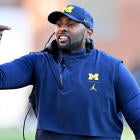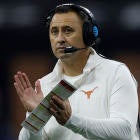In time, we're going to miss UCLA quarterback Josh Rosen, probably more than we realize right now. Few players in today's college game are as honest as he. Rosen is a rare blend of personality, visibility and skill. But athletes, college players especially, live in a world in which they're told repeatedly to "shut up and play."
If a player like Rosen does speak his mind, his words can be taken out of context and used against him. Rosen had one of those classic money quotes in a fascinating Q&A with Matt Hayes of Bleacher Report. When asked about the academic "reality for student-athletes at a major university," Rosen responded, "Raise the SAT requirement at Alabama and see what kind of team they have."
The quote got picked up quickly and suddenly Rosen looked like a bona fide Crimson Tide hater. But let's provide some context.
"I love school, but it's hard. It's cool because we're learning more applicable stuff in my major (Economics)—not just the prerequisite stuff that's designed to filter out people. But football really dents my ability to take some classes that I need. There are a bunch of classes that are only offered one time. There was a class this spring I had to take, but there was a conflict with spring football, so ...
"Look, football and school don't go together. They just don't. Trying to do both is like trying to do two full-time jobs. There are guys who have no business being in school, but they're here because this is the path to the NFL. There's no other way. Then there's the other side that says raise the SAT eligibility requirements. OK, raise the SAT requirement at Alabama and see what kind of team they have. You lose athletes and then the product on the field suffers.
The entire interview is worth a read because it covers a variety of topics and Rosen delivers with a lot of salient points to some challenging questions. Rosen's done the shock value thing before. He wore a "F--- Trump" hat and took an Instagram photo of it. He had a hot tub in his dorm. There have been some antics, however harmless, but sometimes those unfairly get lumped into "character issues" and Rosen has proven to be more thoughtful than that.
Still, there are a few things to digest ...
- You can disagree with Rosen's example without disagreeing with his larger point. His Alabama comment got pulled out and picked apart, and there's a fair criticism for it. Rosen used Alabama as his talking point without much of an explanation. That's perpetuating a stereotype that Alabama football players aren't as smart.
- However, a look at the rest of Rosen's comments show he doesn't think the problem is Alabama, it's the system in which Alabama (and every other NCAA member) operates. "It's not that they [players] shouldn't be in school," Rosen said.
"Human beings don't belong in school with our schedules. No one in their right mind should have a football player's schedule, and go to school. It's not that some players shouldn't be in school; it's just that universities should help them more -- instead of just finding ways to keep them eligible." Staying eligible and enhancing your education are two different things. Grades, while important, don't fully measure all that you've learned. - The time conflict is a common complain among student-athletes. Rosen isn't the first one to compare it to working two full-time jobs, nor is he a pioneer in implying that academic and athletic schedules rarely match up harmoniously. He's spot-on there.
- Rosen's point on players declaring for the NFL Draft early is also noteworthy. "People criticize when guys leave early for the NFL draft, and then rip them when some guys who leave early don't get drafted," Rosen said. "[They say,] 'Why did you leave school if you weren't going to get drafted?' I'll tell you why: Because for a lot of guys, there is no other option. They were either leaving early (for the NFL) or flunking out."
That's obviously not the case for everyone, but with studies showing high school students are less prepared for college now, many are behind right away in an environment that asks a lot of them.
Rosen's points can be, and should be, debated. That's the value in a student-athlete like him going on the record. He's been a critic of the NCAA model before. He won't singlehandedly change the landscape, but having a voice for the student-athlete is important. Someone will take Rosen's place as that voice when he's gone to the NFL, but his honesty will be missed.





















